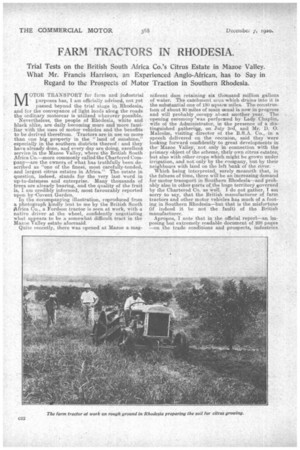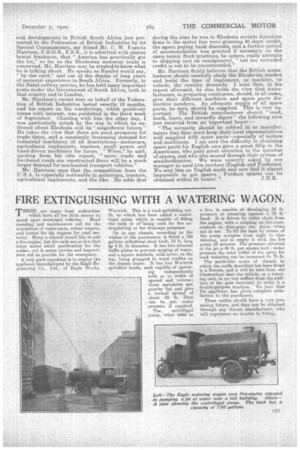FARM TRACTORS IN RHODESIA.
Page 16

Page 17

If you've noticed an error in this article please click here to report it so we can fix it.
Trial Tests on the British South Africa Co.'s Citrus Estate in Mazoe Valley. What Mr. Francis Harrison, an Experienced Anglo-African, has to Say in Regard to the Prospects of Motor Traction in Southern Rhodesia.
MOTOR TRANSPORT for farm and industrial purposes has, I am officially advised, not yet passed beyond the trial stage in Rhodesia, and for the conveyance of light loads along the roads the ordinary motorcar is utilized wherever possible.
Nevertheless, the people of Rhodesia, white and Mack alike, are daily becoming mere and more familiar with the uses of motor vehicles and the benefits to be derived therefrom. 'Tractors are in use on more than one big property in the. "land of sunshine," especially in the southern districts thereof : and they have already done, and every day are doing, excellent service in the Mazoe Valley, where the British South Africa Co.—more commonly called the Chartered Cornany—are the owners of what has truthfully been described as "one of the finest, most carefully-tended, and largest citrus estates in Africa." The estate in question, indeed, stands for the very last word in up-to-dateness and enterprise.. Many thousands of trees are already bearing, and the quality of the fruit is, I am credibly informed, most favourably reported upon byCovent Garden.
In the accompanying illustration, reproduced from a photograph kindly lent to me by the British South ;Africa Co., a Fordson tractor is seen at work, witha native driver at the wheel, confidently negotiating what appears to be a somewhat difficult tract in the Mazoe Valley estate aforesaid.
Quite recently, there was opened at Mazoe a inag nificent dam retaining six thousand million gallons of water. The catchment area which drains into it is the substantial one of 130 square miles. The construction of about 20 miles of main onnal is now in progress and will probably occupy about another year. The opening ceremony was -performed by Lady Chaplin, wife of the Administrator, in the _presence of a distinguished gathering, on July 3rd., and Mr. D. 0. Malcolm, visiting director of the B.S.A. Co., in a -speech delivered on the occrzion, said they were looking forward confidently to great developinents in theMazoe Valley, not only in connection with the primary obje,et of the scheme, their own citrus estates, but also with other crops which might he grown under irrigation, and not only by the company, but by their neighbours with land on the left, hank of the river.
Which being interpreted, surely meaneth that, in the fulness of time, there will be an increasing demand for motor transport in Southern Rhodesia—and probably also in other parts atthe huge territory governed by the Chartered Co. as wen. I do not gather, I am sorry to say, that the British manufacturer of farm tractors and other motor vehicles has, much of a footing in Southern Rhodesia—but that is the misfortune (if indeed it be not the fault) of the British manufacturer. . Apropos, I .note that in the official reporl—an imposing but extremely readable document of 20S pages —on the trade conditions and prospects, industries and developments in British South Africa just presented to the Federation of British Industries by its Special Commissioner, my friend Mr. C. W. Francis Harrison, F.R.G.S., F.S.S., it is admitted with almost brutal frankness, that "America has practically got the lot," so far as the Rhodesian motorcar trade is concerned. Mr,. Harrison may be trusted to know what he is talking about. He speaks as Hamlet would say, "by the card," and out of the depths of long years of personal experience in South Africa. Formerly, in the Natal railway service, he has held many important posts under the Government of South Africa, both in that country and in London.
Mr. Harrison's recent tour on behalf of the l'ederation of British Industries lasted exactly 12 months, and his report on his wanderings, which positively teems with interest., was published in the third week of September. ' Chatting with him the other day, I was particularly struck by the way in which he enthused about Rhodesia and its "magnificent future."
• Ile takes the view that there are good prospects for trade there, and a. constantly increasing demand for industrial machinery of all descriptions—motorcars, agricultural implements, tractors, ,small power and hand-driven machinery for farms. "When," he said, quoting from his own report, "more roads and hardened roads are constructed there will be a much larger demand for mechanical transport vehicles." Mr. Harrison says that the competition from the U.S.A. is especially noticeable in motorcars, tractors, agricultural implements, and the like. He adds that during the time he was in Rhodesia certain American firms in the motor line were'granting 90 days' credit, the agent paying bank discount, and a further period • of accommodation was granted if necessary on the same terms. Such practices, he opines, really amounts to shipping cars on consignment, "but too extended credit is not to be recommended."
Mr. Harrison firmly believes that the British manufacturer should carefully study the Rhodesian market and build the type of implement, or machine, or vehicle, the country demands. I note that, in his report aforesaid, he also holds the view that manufacturers, in preparing catalogues, should, in all cases, give their different machines and spare parts distinctive numbers. An adequate supply of all spare parts he says, should be supplied. This is very important. • The British manufacturer should read, mark, learn, and inwardly digest" the following note just received from an important buyer:— " The necessity should be rubbed in to manufacturers that they must keep their local representatives well supplied with spare parts--especially of motors , and machinery. I am sure the difficulty in obtaining spare parts for English -cars gave a great fillip to the Americans, who paid great attention to the question of spares, and who also scored through their system of standardization. We were recently asked by one manager to send hilt. tractors (English and Fordsons). We sent him an English made and now find it almost impossible to get spares. Fordson spares,, can be obtained within 24 hours! " J.H.K.






























